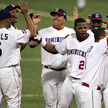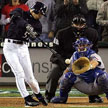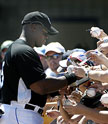Monday, 09 April 2007
 As the Leafs fall out of contention in Toronto, like the Canadiens in Montreal and the Oilers in Edmonton, attention in many parts of the wilderness shifts to springtime. It is time once again to get ready for another year of baseball in the Great White North. While the Blue Jays look to vie for their first playoff appearance in 14 years, the 2007 season promises to be one with many interesting stories and themes on wide range of fronts. For international flavour up front, we have memories of Kobe ... and memories of Shanghai. Then some alternative forms of revenue are adding spice to Major League Baseball in North America. This leads to a fearless forecast for the Year of the Pig. And then it’s all about where the Blue Jays will be, when autumn leaves start to fall. As the Leafs fall out of contention in Toronto, like the Canadiens in Montreal and the Oilers in Edmonton, attention in many parts of the wilderness shifts to springtime. It is time once again to get ready for another year of baseball in the Great White North. While the Blue Jays look to vie for their first playoff appearance in 14 years, the 2007 season promises to be one with many interesting stories and themes on wide range of fronts. For international flavour up front, we have memories of Kobe ... and memories of Shanghai. Then some alternative forms of revenue are adding spice to Major League Baseball in North America. This leads to a fearless forecast for the Year of the Pig. And then it’s all about where the Blue Jays will be, when autumn leaves start to fall.
International flavour — memories of Kobe …
 Continuing from the successful World Cup of Baseball last year, where Japan upended the Cubans to win the inaugural World Championship, baseball once again took on an international flavour in the off-season. Boston shook up the baseball world with its $51 million bid just to negotiate with Japanese pitching sensation Daisuke Matsuzaka. Adding to that posting fee (something previously only seen in the World Football transfer market), Boston signed Matsuzaka to a six-year contract worth over $52 million. Making the total financial commitment just north of $103 million — all for a player that has never crossed the foul lines and competed in a Major League Baseball (MLB) park. Continuing from the successful World Cup of Baseball last year, where Japan upended the Cubans to win the inaugural World Championship, baseball once again took on an international flavour in the off-season. Boston shook up the baseball world with its $51 million bid just to negotiate with Japanese pitching sensation Daisuke Matsuzaka. Adding to that posting fee (something previously only seen in the World Football transfer market), Boston signed Matsuzaka to a six-year contract worth over $52 million. Making the total financial commitment just north of $103 million — all for a player that has never crossed the foul lines and competed in a Major League Baseball (MLB) park.
As if to justify the $103 million expenditure, talk in Boston management quickly turned to the ancillary benefits of adding a foreign superstar. President Larry Lucchino spoke of "expanding the Red Sox footprint in Asia," urging there would be new advertising partnerships with Japanese companies and more "Matsuzaka" merchandise to sell. The Sox peg Matsuzaka’s direct economic impact to the team of being about $3 million annually.
 What makes this signing so intriguing, besides Matsuzaka’s reputed unhittable Gyroball, is its implications on a budding international transfer market for baseball. This was the first time where teams actively competed in a secret sealed bid auction for a player. The strict confidentiality and secrecy surrounding the whole process was one out of a spy novel, further contributing to the "Matsuzaka" aura. What makes this signing so intriguing, besides Matsuzaka’s reputed unhittable Gyroball, is its implications on a budding international transfer market for baseball. This was the first time where teams actively competed in a secret sealed bid auction for a player. The strict confidentiality and secrecy surrounding the whole process was one out of a spy novel, further contributing to the "Matsuzaka" aura.
As mentioned, in World Football, soccer giants such as Real Madrid and Manchester United have always paid top dollar to land international stars for both their talent and their international appeal. This allowed them to tap previously virgin big league sports markets such as Asia in the 1990s. This strategy was further North Americanized this past winter, with the Los Angeles Galaxy’s signing of David Beckham for a reported $250 million — in an effort to promote their franchise and Major League Soccer (MLS), to an American audience that has always been ambivalent to the sport.
 That notwithstanding, even though international ball players such as Ichiro Suzuki of the Seattle Mariners have been signed in the past, this cross pollinization between baseball talent and international marketability has never captured baseball imagination as it has done with Daisuke Matsuzaka. Despite the 14-hour time difference, six TV cameras and two satellite trucks transmitted Matsuzaka's arrival in the spring training parking lot live every morning. No doubt, his arrival in the MLB has set off a hysteria among the international media and baseball fans alike, and he has the nickname "Dice-K" before ever throwing a pitch in a big league game. That notwithstanding, even though international ball players such as Ichiro Suzuki of the Seattle Mariners have been signed in the past, this cross pollinization between baseball talent and international marketability has never captured baseball imagination as it has done with Daisuke Matsuzaka. Despite the 14-hour time difference, six TV cameras and two satellite trucks transmitted Matsuzaka's arrival in the spring training parking lot live every morning. No doubt, his arrival in the MLB has set off a hysteria among the international media and baseball fans alike, and he has the nickname "Dice-K" before ever throwing a pitch in a big league game.
Only time will tell if this is trend that will alter baseball’s economic landscaper, or a one-off for an exceptional baseball talent. Where have you gone Fernando Valenzuela?
And memories of Shanghai ...
 Continuing on the international trend, the New York Yankees agreed in the winter to send coaches, scouts, and trainers to China, to help boost interest in baseball, furthering a push by the major leagues into one of the world's fastest-growing sports markets. Under the agreement, the government-backed Chinese Baseball Association (CBA) will send staff to the Yankees' facilities in New York and Tampa, Fla., while Yankees personnel will assist the Chinese national team along with some other clubs. Continuing on the international trend, the New York Yankees agreed in the winter to send coaches, scouts, and trainers to China, to help boost interest in baseball, furthering a push by the major leagues into one of the world's fastest-growing sports markets. Under the agreement, the government-backed Chinese Baseball Association (CBA) will send staff to the Yankees' facilities in New York and Tampa, Fla., while Yankees personnel will assist the Chinese national team along with some other clubs.
Though modest in scope, the agreement underscores baseball's big ambitions for China. The world's most populous country, China has a growing, prosperous middle-class and a sports market estimated to be worth $10 billion-plus annually. The Yankees' goal is to get their brand into the world's potential biggest market, and put themselves in position, down the road, to scout talent, while working with members of the CBA to improve the state of baseball in China.
 In the past, the Los Angeles Dodgers and Toronto Blue Jays were similarly the first teams to firmly establish themselves in the Dominican Republic. (Something the Jays have discarded under their present management regime.) Nothing prevents other Major League Baseball teams from attempting to reach the same strategic alliance that the Yankees have formalized. In the past, the Los Angeles Dodgers and Toronto Blue Jays were similarly the first teams to firmly establish themselves in the Dominican Republic. (Something the Jays have discarded under their present management regime.) Nothing prevents other Major League Baseball teams from attempting to reach the same strategic alliance that the Yankees have formalized.
Still, it is quite clear that the power of the Yankee brand all over the world is what's driving all this. To the competitors who lament this "evil nation," it’s just another reason to cry "Damn Yankees!"
Alternative forms of revenue — the pot keeps getting bigger …
Increase of baseball revenues has dramatically effected baseball operations, and has potential down the road to greatly impact the game’s competitiveness. This is happening primarily due to two relatively new revenue streams:
(A) Internet Revenues (MLBAM)
 Major League Baseball Advanced Media (MLBAM) is a subsidiary of Major League Baseball and is the internet and interactive branch of the league. The company operates the official web site for the league and its 30 Major League Baseball club web sites via MLB.com, drawing over five million hits per day. Major League Baseball Advanced Media (MLBAM) is a subsidiary of Major League Baseball and is the internet and interactive branch of the league. The company operates the official web site for the league and its 30 Major League Baseball club web sites via MLB.com, drawing over five million hits per day.
This once latent baseball arm is growing into a vertically integrated force within the sport. Investment banks looked into a possible initial public offering for the business a year ago, and concluded that MLBAM alone is worth more then $2.5 billion.
 To put just a few numbers into perspective, from 2004 to 2005 sales on MLB.com rose 220% from the year prior with a 200% increase in sales just through the MLB.com Shop. Further, MLBAM revenues for 2005 rose 88% to $260 million, and annual revenue is expected to jump 40-60% over each of the next five years. This is an unexpected huge cash cow for the 30 owners in MLB who get to split the profits. To put just a few numbers into perspective, from 2004 to 2005 sales on MLB.com rose 220% from the year prior with a 200% increase in sales just through the MLB.com Shop. Further, MLBAM revenues for 2005 rose 88% to $260 million, and annual revenue is expected to jump 40-60% over each of the next five years. This is an unexpected huge cash cow for the 30 owners in MLB who get to split the profits.
Driving this growth has been a combination of technology advances, peoples’ desire to access information via the net, and internet providers making the broadband available to stream live video. MLBAM streams more live content than any other Web site in the world, and has just only started to make baby steps in selling commercials on those broadcasts — a very attractive offering for advertisers looking to run ads that viewers won't use a clicker or TiVo to avoid.
 To appreciate MLBAM’s potential significance in lessening team revenue disparities note that at the moment, although nationally televised games split profits evenly between teams, local broadcast revenues are primarily the domain of the individual teams. Thus, large market teams such as New York have tremendous advantages over smaller market teams like Seattle. In fact, the Yankees $62 million in cable money from the YES channel in 2006 was by far the most in the league, and roughly ten times more than what small market teams can charge. To appreciate MLBAM’s potential significance in lessening team revenue disparities note that at the moment, although nationally televised games split profits evenly between teams, local broadcast revenues are primarily the domain of the individual teams. Thus, large market teams such as New York have tremendous advantages over smaller market teams like Seattle. In fact, the Yankees $62 million in cable money from the YES channel in 2006 was by far the most in the league, and roughly ten times more than what small market teams can charge.
MLBAM through its revenue sharing has the potential to curb this disparity and return equality to the baseball field — as internet technology becomes more widely adopted and habits of how baseball fans access the sport change. MLBAM has the potential, in say seven to 10 years, to make the sport the share-the-wealth socialist paradise that has been long entrenched competition within the National Football League.
(B) Baseball Channel Cable Revenues
 Baseball cable revenues from MLB Extra Innings have become a boon and a further unexpected source of revenue for MLB teams. Over the last few years Major League Baseball has offered the very successful MLB Extra Innings through a variety of cable operators, driven by the demand of many uprooted Americans who wish to watch "their" team wherever they are in the country. Total revenue from this channel toped $170 million in 2006. Baseball cable revenues from MLB Extra Innings have become a boon and a further unexpected source of revenue for MLB teams. Over the last few years Major League Baseball has offered the very successful MLB Extra Innings through a variety of cable operators, driven by the demand of many uprooted Americans who wish to watch "their" team wherever they are in the country. Total revenue from this channel toped $170 million in 2006.
And note the insatiable need with which Americans consume their national pastime. Major League Baseball announced its $700 million, seven-year agreement with DirecTV this off-season, with the hope of launching a 24-hour baseball channel similar to the Golf network. DirecTV will make The Baseball Channel available when the network launches in 2009, and DirecTV will be a minority partner in the network.
 As DirecTV requires a satellite dish and separate subscription, this new agreement has caught the eye of legislators such as former presidential candidate John Kerry. He argues that the agreement will "disenfranchise baseball fans in the 75 million multi-channel households who do not subscribe to DirecTV," and "represents the height of disrespect and disregard for their loyal baseball fans." To that end, it seems that the US Congress is now the main roadblock to this "NFL-esque" DirecTV monopoly. As DirecTV requires a satellite dish and separate subscription, this new agreement has caught the eye of legislators such as former presidential candidate John Kerry. He argues that the agreement will "disenfranchise baseball fans in the 75 million multi-channel households who do not subscribe to DirecTV," and "represents the height of disrespect and disregard for their loyal baseball fans." To that end, it seems that the US Congress is now the main roadblock to this "NFL-esque" DirecTV monopoly.
This creates an interesting argument related to the universality of what one might claim is a public institution. It is plausible to urge that in return for the significant government subsidies and public patronage that are bestowed upon MLB, the political process has the right to place some constraints on MLB’s propensity to commercialize. Public policy should pursue a balance between the private economic interests in the game, and the importance of preserving access to America’s pastime for all fans.
We shall see how this plays out in the months to come …
2007 Year of the Pig’s fearless forecast!
 Experts say dollars from the new revenue sources are already allowing poorer teams to spend more on players this past off-season than previously, and having an impact on what prospective buyers are willing to pay for MLB franchises. Along with revenue sharing (Yankees contributed $70 million in 2006), this has added to the coffers of all MLB teams, giving them resources that contributed to the tremendous bidding up of players on this years Free Agency market. Experts say dollars from the new revenue sources are already allowing poorer teams to spend more on players this past off-season than previously, and having an impact on what prospective buyers are willing to pay for MLB franchises. Along with revenue sharing (Yankees contributed $70 million in 2006), this has added to the coffers of all MLB teams, giving them resources that contributed to the tremendous bidding up of players on this years Free Agency market.
With so much new money bandied about by MLB teams, players in the midst of lucrative long term deals such as Aramis Ramirez of the Chicago Cubs, and JD Drew of the Los Angeles Dodgers, decided to opt-out of their current contracts in hopes of cashing in on the revenue windfall. This is unprecedented, as players who already had huge existing contracts, and more importantly an opt-out clause stipulated in their agreements, acted en masse, and each in turn was able to sign for more years and significantly more money.
 To further accentuate the madness, mediocre players with limited pedigree were given money not commensurate with past performance. Case in point: Kansas City Royals right-hander Gil Meche, a mediocre starter at best, now boasts a higher average salary than the Yankees' Mariano Rivera, perhaps the greatest closer in history. And to think, it wasn’t long ago that baseball clubs were crying poor and demanding public welfare to bail them out — of situations that they in fact were responsible for themselves. This new revenue boon in baseball should also be remembered when clubs try to extort public monies to keep them in town, or to refurbish or build a new stadium. To further accentuate the madness, mediocre players with limited pedigree were given money not commensurate with past performance. Case in point: Kansas City Royals right-hander Gil Meche, a mediocre starter at best, now boasts a higher average salary than the Yankees' Mariano Rivera, perhaps the greatest closer in history. And to think, it wasn’t long ago that baseball clubs were crying poor and demanding public welfare to bail them out — of situations that they in fact were responsible for themselves. This new revenue boon in baseball should also be remembered when clubs try to extort public monies to keep them in town, or to refurbish or build a new stadium.
In keeping with this theme, the adage from the movie All the President’s Men could be most apropos in my handicapping of the 2007 season. "Follow the money," and so I shall, and thus predict a Subway series between the New York Mets and Yankees with the Amazing Mets prevailing in an October classic!
Blue Jays hopes ... will the baseball gods shine on them come October?
 It is no stretch to assert that the 2007 Toronto Blue Jays will only go as far as their pitching. The Blue Jays, if healthy, have many potent bats and enough pitching to challenge the Yankees and Red Sox. But their pitching staff, through injury and lack of development, is frighteningly thin, and is still waiting for the likes of Brandon League to come back from Syracuse to stay. Any long-term injury to the front end of the rotation (Roy Halladay), or their closer (BJ Ryan), could scuttle any thoughts of post-season play in the formerly named SkyDome. It is no stretch to assert that the 2007 Toronto Blue Jays will only go as far as their pitching. The Blue Jays, if healthy, have many potent bats and enough pitching to challenge the Yankees and Red Sox. But their pitching staff, through injury and lack of development, is frighteningly thin, and is still waiting for the likes of Brandon League to come back from Syracuse to stay. Any long-term injury to the front end of the rotation (Roy Halladay), or their closer (BJ Ryan), could scuttle any thoughts of post-season play in the formerly named SkyDome.
Yet you must ask. Where are all the kids vying for positions from the farm system. This JP Riccardi regime, which has seen six years of mediocre baseball, has yet to fulfill its mandate of making the club competitive and sustainable with the development of young players. This was his Moneyball mantra and one of the main reasons he was hired by Paul Godfrey those six seasons ago. Riccardi has failed dreadfully to produce a team like perennial winners Atlanta Braves, that develops young (cheap) talent ready for big league action and able to succeed older (more expensive) big league players.
 The proof is in the pudding. Once the most successful franchise for developing the most players year-in and year-out, the Blue Jays in Riccardi’s tenure have only developed one player (Aaron Hill), who has been able to crack the big club’s lineup. The proof is in the pudding. Once the most successful franchise for developing the most players year-in and year-out, the Blue Jays in Riccardi’s tenure have only developed one player (Aaron Hill), who has been able to crack the big club’s lineup.
This, I believe, is the crux of the matter when looking at the Jays both for this season and in the long term. They simply cannot compete with the Yankees and Red Sox financially and must develop their own players to have any sustained shot at being competitive. It is this mis-management, both in its failure to consistently provide the appropriate resources for scouting and development, and in its poor decisions and judgments on drafting and trades, that lies at the bottom of why Toronto has had to use the Free Agent market so extensively these last two off-seasons.
 Essentially, they have had to cover their development deficiency with supplemental talent at an over-inflated price. During the winter Toronto’s main acquisition was the aging Frank Thomas at a hefty $18.5 million over two years — just too much for an oft-injured bat, when the Jays need more arms to complement ace Roy Halladay. Essentially, they have had to cover their development deficiency with supplemental talent at an over-inflated price. During the winter Toronto’s main acquisition was the aging Frank Thomas at a hefty $18.5 million over two years — just too much for an oft-injured bat, when the Jays need more arms to complement ace Roy Halladay.
Quite frankly, there is little room for error this season. The Blue Jays still have far to go to recapture the glory of being the best baseball organization throughout the 1980s to the early 1990s. They may be able to squeak out 90 wins and finally play meaningful baseball in the months of September and October. Or they just may have to wait until the fickle baseball gods decide it's their turn again.
Robert Sparrow is a Toronto marketing analyst and noted local authority on the sporting life.
References
http://msn.foxsports.com/mlb/story/6609896
http://msn.foxsports.com/mlb/story/6600124
http://www.sportsnet.ca/baseball/article.jsp?content=20070327_124716_1692
http://sports.espn.go.com/mlb/news/story?id=2742462
http://wcbs880.com/pages/192452.php?contentType=4&contentId=298141
http://www.hardballtimes.com/main/article/mlbam-the-stealthy-money-machine/
http://sports.espn.go.com/mlb/news/story?id=2792214
http://www.forbes.com/2006/04/17/06mlb_baseball-team-valuations-cx_mo_0420sports.html
Sports Illustrated, March 28, 2007
Andrew Zimbalist, Baseball and Billions (HarperCollins 1994)
Marvin Miller, A Whole Different Ball Game (Birch Lane Press 1991) Only registered users can write comments.
Please login or register. Powered by AkoComment 1.0 beta 2!
|
